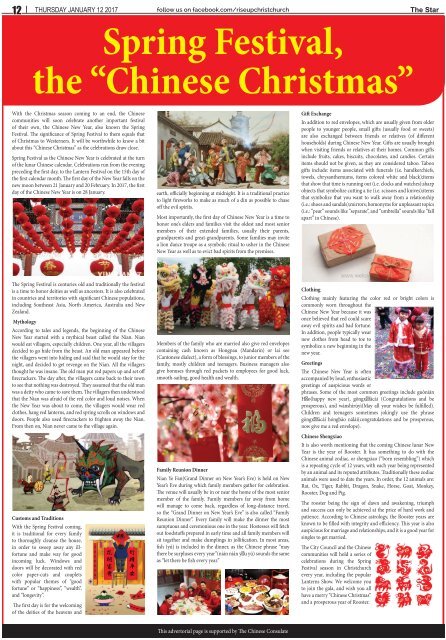The Star: January 12, 2017
You also want an ePaper? Increase the reach of your titles
YUMPU automatically turns print PDFs into web optimized ePapers that Google loves.
<strong>12</strong> Thursday <strong>January</strong> <strong>12</strong> <strong>2017</strong><br />
follow us on facebook.com/riseupchristchurch<br />
<strong>The</strong> <strong>Star</strong><br />
Spring Festival,<br />
the “Chinese Christmas”<br />
With the Christmas season coming to an end, the Chinese<br />
communities will soon celebrate another important festival<br />
of their own, the Chinese New Year, also known the Spring<br />
Festival. <strong>The</strong> significance of Spring Festival to them equals that<br />
of Christmas to Westerners. It will be worthwhile to know a bit<br />
about this “Chinese Christmas” as the celebrations draw close.<br />
Spring Festival as the Chinese New Year is celebrated at the turn<br />
of the lunar Chinese calendar. Celebrations run from the evening<br />
preceding the first day, to the Lantern Festival on the 15th day of<br />
the first calendar month. <strong>The</strong> first day of the New Year falls on the<br />
new moon between 21 <strong>January</strong> and 20 February. In <strong>2017</strong>, the first<br />
day of the Chinese New Year is on 28 <strong>January</strong>.<br />
earth, officially beginning at midnight. It is a traditional practice<br />
to light fireworks to make as much of a din as possible to chase<br />
off the evil spirits.<br />
Most importantly, the first day of Chinese New Year is a time to<br />
honor one’s elders and families visit the oldest and most senior<br />
members of their extended families, usually their parents,<br />
grandparents and great-grandparents. Some families may invite<br />
a lion dance troupe as a symbolic ritual to usher in the Chinese<br />
New Year as well as to evict bad spirits from the premises.<br />
Gift Exchange<br />
In addition to red envelopes, which are usually given from older<br />
people to younger people, small gifts (usually food or sweets)<br />
are also exchanged between friends or relatives (of different<br />
households) during Chinese New Year. Gifts are usually brought<br />
when visiting friends or relatives at their homes. Common gifts<br />
include fruits, cakes, biscuits, chocolates, and candies. Certain<br />
items should not be given, as they are considered taboo. Taboo<br />
gifts include: items associated with funerals (i.e. handkerchiefs,<br />
towels, chrysanthemums, items colored white and black);items<br />
that show that time is running out (i.e. clocks and watches);sharp<br />
objects that symbolize cutting a tie (i.e. scissors and knives);items<br />
that symbolize that you want to walk away from a relationship<br />
(i.e.: shoes and sandals);mirrors; homonyms for unpleasant topics<br />
(i.e.: “pear” sounds like “separate”, and “umbrella” sounds like “fall<br />
apart” in Chinese).<br />
<strong>The</strong> Spring Festival is centuries old and traditionally the festival<br />
is a time to honor deities as well as ancestors. It is also celebrated<br />
in countries and territories with significant Chinese populations,<br />
including Southeast Asia, North America, Australia and New<br />
Zealand.<br />
Mythology<br />
According to tales and legends, the beginning of the Chinese<br />
New Year started with a mythical beast called the Nian. Nian<br />
would eat villagers, especially children. One year, all the villagers<br />
decided to go hide from the beast. An old man appeared before<br />
the villagers went into hiding and said that he would stay for the<br />
night, and decided to get revenge on the Nian. All the villagers<br />
thought he was insane. <strong>The</strong> old man put red papers up and set off<br />
firecrackers. <strong>The</strong> day after, the villagers came back to their town<br />
to see that nothing was destroyed. <strong>The</strong>y assumed that the old man<br />
was a deity who came to save them. <strong>The</strong> villagers then understood<br />
that the Nian was afraid of the red color and loud noises. When<br />
the New Year was about to come, the villagers would wear red<br />
clothes, hang red lanterns, and red spring scrolls on windows and<br />
doors. People also used firecrackers to frighten away the Nian.<br />
From then on, Nian never came to the village again.<br />
Customs and Traditions<br />
With the Spring Festival coming,<br />
it is traditional for every family<br />
to thoroughly cleanse the house,<br />
in order to sweep away any illfortune<br />
and make way for good<br />
incoming luck. Windows and<br />
doors will be decorated with red<br />
color paper-cuts and couplets<br />
with popular themes of “good<br />
fortune” or “happiness”, “wealth”,<br />
and “longevity”.<br />
<strong>The</strong> first day is for the welcoming<br />
of the deities of the heavens and<br />
Members of the family who are married also give red envelopes<br />
containing cash known as Hongpau (Mandarin) or lai see<br />
(Cantonese dialect), a form of blessings, to junior members of the<br />
family, mostly children and teenagers. Business managers also<br />
give bonuses through red packets to employees for good luck,<br />
smooth-sailing, good health and wealth.<br />
Family Reunion Dinner<br />
Nian Ye Fan(Grand Dinner on New Year’s Eve) is held on New<br />
Year’s Eve during which family members gather for celebration.<br />
<strong>The</strong> venue will usually be in or near the home of the most senior<br />
member of the family. Family members far away from home<br />
will manage to come back, regardless of long-distance travel,<br />
so the “Grand Dinner on New Year’s Eve” is also called “Family<br />
Reunion Dinner”. Every family will make the dinner the most<br />
sumptuous and ceremonious one in the year. Hostesses will fetch<br />
out foodstuffs prepared in early time and all family members will<br />
sit together and make dumplings in jollification. In most areas,<br />
fish (yú) is included in the dinner, as the Chinese phrase “may<br />
there be surpluses every year”(nián nián yǒu yú) sounds the same<br />
as “let there be fish every year.”<br />
Clothing<br />
Clothing mainly featuring the color red or bright colors is<br />
commonly worn throughout the<br />
Chinese New Year because it was<br />
once believed that red could scare<br />
away evil spirits and bad fortune.<br />
In addition, people typically wear<br />
new clothes from head to toe to<br />
symbolize a new beginning in the<br />
new year.<br />
Greetings<br />
<strong>The</strong> Chinese New Year is often<br />
accompanied by loud, enthusiastic<br />
greetings of auspicious words or<br />
phrases. Some of the most common greetings include guònián<br />
Hǒo(happy new year), gōngxǒfācái (Congratulations and be<br />
prosperous), and wànshìrúyì(May all your wishes be fulfilled).<br />
Children and teenagers sometimes jokingly use the phrase<br />
gōngxǒfācái hóngbāo nálái(congratulations and be prosperous,<br />
now give me a red envelope).<br />
Chinese Shengxiao<br />
It is also worth mentioning that the coming Chinese lunar New<br />
Year is the year of Rooster. It has something to do with the<br />
Chinese animal zodiac, or shengxiao (“born resembling”) which<br />
is a repeating cycle of <strong>12</strong> years, with each year being represented<br />
by an animal and its reputed attributes. Traditionally these zodiac<br />
animals were used to date the years. In order, the <strong>12</strong> animals are:<br />
Rat, Ox, Tiger, Rabbit, Dragon, Snake, Horse, Goat, Monkey,<br />
Rooster, Dog and Pig.<br />
<strong>The</strong> rooster being the sign of dawn and awakening, triumph<br />
and success can only be achieved at the price of hard work and<br />
patience. According to Chinese astrology, the Rooster years are<br />
known to be filled with integrity and efficiency. This year is also<br />
auspicious for marriage and relationships, and it is a good year for<br />
singles to get married.<br />
<strong>The</strong> City Council and the Chinese<br />
communities will hold a series of<br />
celebrations during the Spring<br />
Festival season in Christchurch<br />
every year, including the popular<br />
Lanterns Show. We welcome you<br />
to join the gala, and wish you all<br />
have a merry “Chinese Christmas”<br />
and a prosperous year of Rooster.<br />
This advertorial page is supported by <strong>The</strong> Chinese Consulate


















